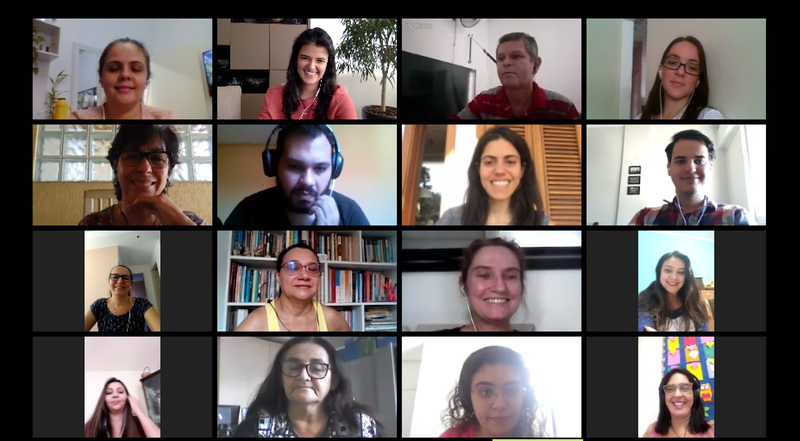A Step Toward Democratizing Our Program Funding Decisions

Back in April, when COVID-19 turned our worlds upside down, Imaginable Futures teamed up with the Lemann Foundation to commit a
combined $1 million
for a COVID-19 emergency relief program in Brazil. The idea was to provide public schools there with resources and support ― connectivity, digital platforms, robust remote curriculum and context-relevant professional development ― to keep learners engaged and on track even when they could not physically attend school.
Not long into this emergency relief initiative, we found ourselves taking on an increasingly operational role to keep pace with the vast array of pandemic-related demands. We also realized that smaller organizations with specific expertise could spot opportunities and offer locally rooted interventions that we missed. In other words, to make education truly equitable, an equally diverse set of actors must be seen, heard and funded to promote positive interventions and change. We needed more participants to help push us beyond the limitations of our existing networks and processes to make a difference for as many Brazilian students as possible.
How the RFP Process Helped Us Discover Impactful Organizations Beyond Our Existing Networks
That’s precisely why Imaginable Futures and the Lemann Foundation dedicated $330,000 of our emergency relief fund to a request-for-proposal (RFP) process designed to help democratize our program funding decisions. In May, we invited eligible organizations to submit proposals on how they can address a specific area of need within Brazil’s education system (from preschool to high school). Our own teams at Imaginable Futures and the Lemann Foundation set out to review the hundreds of proposals we received in two weeks and narrowed them to 30. From those, our new teacher advisory board helped us select 11 promising projects, which will each receive a grant averaging R$160,000 ($30,000).
The 11 projects are:
- Avisa Lá: Comitê de Primeira Infância para o volta às aulas
- Mopi: Trilha de Desenvolvimento Infantil
- Joca: Jornalismo e interdisciplinaridade
- Eu Ensino: Eu Ensino de Casa
- 3emeio: Takorama Festival de Cinema
- Mathema: Replanejamento Escolar 2020
- Primeira Escolha: Avaliações diagnósticas
- We World & Caritas de Crateús: Educação Contextualizada
- Vozes da Educação: Elas na Escola
- Letrus: Diagnóstico de escrita
- Movva: Eduq+ apoiando a estratégia de busca ativa da Secretaria Estadual de Educação de SP
The new process allowed us to help address issues that we never could before. For instance, we know that past health crises, such as the 2016 Ebola outbreak, resulted in a surge in domestic violence and abuse against girls, which in turn had a significant impact on school dropout rates. However, we didn’t know an organization in Brazil was already planning on addressing this serious problem. Them at School (Elas na Escola, which uses a feminine pronoun) is tackling violence and sexual abuse against girls and women during the pandemic. Vozes da Educação, a consultancy that offers support to public school districts and states to improve policy, teaching and learning, designed this program as a response to the RFP. With the awarded funding, they are providing girls and school staff with personalized support, information and resources on physical and sexual violence, safety nets, reproductive rights, financial education and self-esteem. With a robust impact-evaluation process in place, their goal is to contribute to improving public policy around this issue in Brazil.
We also found fresh approaches to fundamentally improving whole-child learning outcomes in Brazil, during and beyond the pandemic. Joca Journal, a journalism-centered interdisciplinary project that promotes access to quality journalistic content for educators, youth and public school learners, offers curriculum and content that encourages learners to think critically about the world around them. The organization contextualizes content by age group and aligns it with activities, lesson plans and multimedia engagement. The program trains teachers to integrate journalistic content into classroom learning, connects students to national and global events and encourages journalistic reading habits that stimulate critical, reflective thinking and good global citizenship.
Similarly, a new partnership with Primeira Escolha helps identify and measure indicators on learning, engagement, vulnerabilities and school dropout risk among middle school Portuguese and math students. The evaluations — an initial, full diagnostic assessment paired with five follow-up mini tests in the second semester — are all completed online, so educators can track progress and proficiencies according to the national learning standards regardless of when Brazil’s school doors reopen.
Placing Our Community at the Center
One of the exciting aspects we created in this process is an advisory board led by teachers. Teachers understand better than anyone the challenges experienced by them and their students. Our advisers evaluated the finalists’ proposals on a detailed rubric, including value proposal to teachers and learners, likely implementation challenges and relevance of the issues to their own networks and experiences. Because their enthusiasm is a unique indicator of a project’s feasibility and potential, their decisions give us confidence that we are funding the most impactful initiatives.
Our Learnings as We Move Ahead
While we are excited about the opportunity that the RFP process allowed for efficiency in mapping the landscape of wide-ranging solutions and corresponding demand, we recognize that it is still a work in progress. For example, we attracted very few proposals from Black entrepreneurs during the initial round, and are currently examining strategies to make the process more inclusive in the future. As we move forward, we will actively and intentionally seek and test strategies that help us invest more equitably. As is always the case, Imaginable Futures is committed to learning at every step and reflecting those learnings back into the way we show up in the world, as philanthropic investors and citizens. Opening the door to a more diversified group of changemakers, while involving the authentic voices of our community at the center of our decision-making, marks an important step